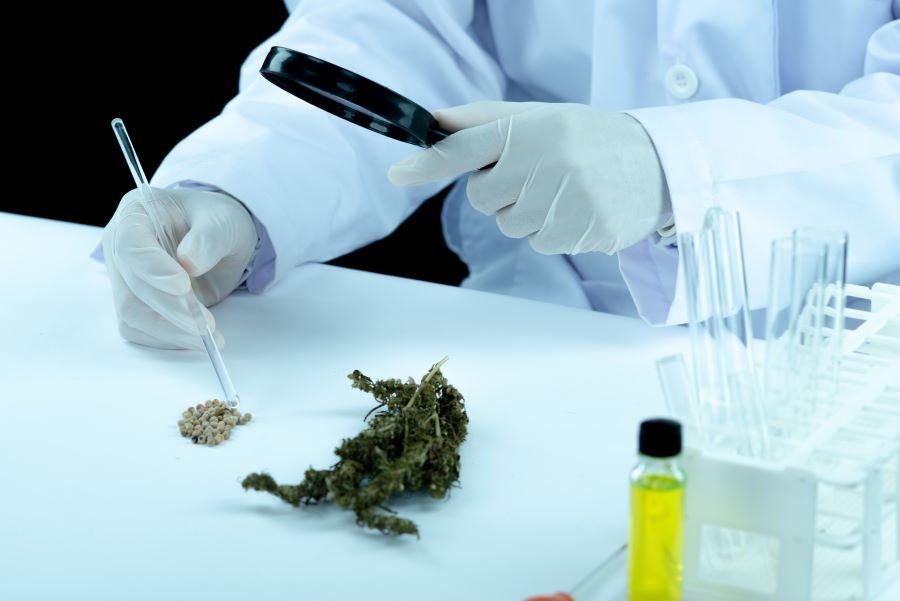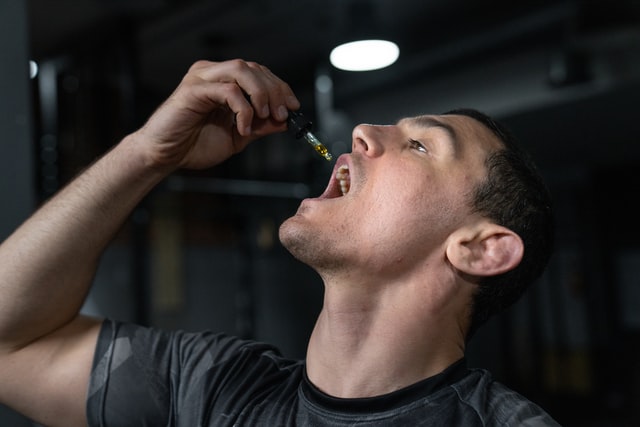
Today, even casual cannabis consumers are more familiar with the major components of cannabis plants than previous generations. This is in part due to the mainstream availability of legal cannabis extracts and products, providing people with a wider range of natural therapeutic alternatives to conventional drugs.
Tetrahydrocannabinol (THC) and cannabidiol (CBD) are two well-known cannabinoids that are readily available in many forms; from edibles to tinctures and even topical treatments. These two compounds work on the body by affecting how the endocannabinoid system responds to internal and external stimulation. In recent years, CBD in particular has grown in popularity due to its ability to mitigate the severity of conditions including anxiety, insomnia, and depression — all without the intoxicating effects of THC.
Cannabidiolic acid (CBDA) is a lesser-known cannabinoid because it’s the raw precursor to CBD. Since the 2019 CannMed Conference in California, when Professor Raphael Mechoulam (a pioneer in cannabis research) reported his latest findings on CBDA, new interest was sparked among researchers and cannabis consumers alike.
What Is CBDA?
Cannabidiolic acid or CBDA was isolated in 1955, and was the first discovered cannabinoid acid. CBDA is a cannabinoid that is naturally available in raw cannabis plants, but is most abundantly found in the hemp plant. Only after going through a process called decarboxylation does CBDA get converted into CBD, its more stable and better-known counterpart.
Is CBDA Better Than CBD?
Although we are still in the early stages of research, CBDA shows promise in terms of its therapeutic potential. Early research suggests that it may be as effective as CBD in terms of reducing pain and anxiety, and has established that both CBD and CBDA are non-intoxicating due to their low THC content.
While CBD has been approved by the Food and Drug Administration (FDA) for treatment of a rare form of epilepsy, CBDA has yet to be formally approved to treat, cure, or prevent any specific conditions. In terms of public consensus via anecdotal testimony, CBD has become well established as a health supplement with a wide range of benefits that can improve consumers’ overall health. On the other hand, most of the discussion surrounding CBDA is still focused on pain relief and its unique antiemetic qualities.
Though CBDA is as of yet less researched, it’s not for any lack of interest. CBDA does exhibit some properties that CBD lacks and has some amplified affinities to certain receptors since it is a less-refined precursor to CBD.
Although “better” is hard to determine, there is evidence that CBDA may be more effective in managing certain conditions due to its ability to inhibit Cox-2 enzyme (which is responsible for inflammation). This is why many researchers view it as a potentially stronger anti-inflammatory supplement than CBD, the implication being that it may serve as a potent yet safe alternative to conventional options like non-steroidal anti-inflammatory drugs (NSAIDs) and opiates.
Research also shows that significantly lower doses of CBDA are needed to improve the efficacy of anti-nausea drugs compared to CBD. Lower dose sizes mean lower risk of adverse reactions; when paired with the fact that it requires less processing than CBD, this could also translate to lower market prices overall.
CBDA Tincture: What Is It?

Cannabis tinctures are among the oldest mediums of cannabis ingestion, dating back centuries. A CBDA tincture is a liquid extract made from raw cannabis or hemp. It’s made by putting the plant material in a solvent to extract all the plant’s various compounds. CBDA tinctures are made using the same general process as THC-rich cannabis oil — though due to CBDA’s unique properties, it requires different solvents and an extra purification step.
There are THC-free CBDA tincture oils available, as well as full-spectrum formulations for those interested in taking advantage of the Entourage Effect caused by the interactions between CBDA and the terpenes within the plant. Full spectrum formulations do contain some THC but in very low quantities (less than 0.3%), so there’s no risk of cognitive impairment or delayed motor response.
Like other cannabis extract products, a reliable CBDA tincture will have its potency, extraction method, a complete list of contents (additional cannabinoids, terpenes, etc.), as well as dosage information readily available on the packaging or label. When shopping for a CBDA tincture, one of the best ways to ensure that the label and packaging information is accurate is to check for third-party lab testing or a certificate of analysis (COA).
How is CBDA Extracted From Raw Cannabis?
All cannabinoids start as cannabigerolic acid (CBGA), a non-psychoactive cannabinoid. With the help of the synthase enzymes, CBGA gets converted into the three base cannabinoid acids: cannabidiolic acid (CBDA), tetrahydrocannabinolic acid (THCA), and cannabichromenic acid (CBCA).
CBDA is only available in very small quantities in most cannabis plants. However, hemp plants are known for having high CBDA content with only trace amounts of THCA. This is why most CBDA is sourced from raw, unprocessed hemp rather than marijuana.
CBDA can be produced by dissolving cannabis plant matter in high-proof grain alcohol. Some DIYers have even been known to make tinctures at home using solvents like vinegar or glycerin. The resulting product is often approximately 70% alcohol but contains high CBDA concentrations.
Does CBDA come from Cannabis Flower?
CBDA, like most other cannabinoids, can primarily be found in the cannabis flowers (buds) with only trace amounts being in the leaves or stems. Since it’s the precursor to CBD, any high-CBD cannabis strain will also contain higher quantities of CBDA.
Benefits of CBDA for Mental Health

Like many CBD products, CBDA has shown significant promise in terms of its potential benefits related to managing symptoms of physiological conditions, and also some related to mental health. This is due to its ability to cause intense activation of the 5-HT1A serotonin receptors.
Serotonin is a neurotransmitter that affects mood, sleep, appetite and other functions. It’s primarily produced in the gut, but also in the brain. This means serotonin production can be disrupted by stress or diet. CBDA being able to directly affect the 5-HT1A serotonin receptors is what gives it such potent antiemetic and anti-anxiety properties.
Many are hopeful about CBDA’s many potential health benefits, including the promise it’s showing as a potential breast cancer therapy. A 2012 investigation revealed that it “inhibits migration of the highly invasive MDA-MB-231 human breast cancer cells.” This means that CBDA could potentially slow the proliferation of these cancerous cells, minimizing the amount of damaged tissue. Consumers will attest that CBDA tinctures offer a wide range of therapeutic benefits, and emerging research seems to be confirming many of their claims.
Popular Products Containing CBDA
While CBD products are widely available on the market, CBDA products are still slightly limited in variety, which is in part due to its more unstable composition. However, those interested in trying CBDA can find it in a variety of tinctures, oil drops, and even some gummies. Recently, some companies have even started releasing water-soluble liquids and powders. However, a CBDA oil tincture is still the best option if you’re comfortable with customizing your dosage potency and prefer higher doses.
The CBDA market isn’t very well saturated yet, so finding tinctures purely composed of CBDA can be tough. Many companies offer blends with either CBGA or CBD. Since CBDA is most abundantly found in hemp, a common go-to source of quality CBDA is hemp teas. This works because the plant matter isn’t exposed to heat for long periods, and heat involved in steeping isn’t high enough to prompt the decarboxylation process required to convert CBDA into raw CBD.
It’s worth noting that supplementation using any cannabinoid-based tinctures should always be discussed with one’s physician first. Not all bodies, diets, and circumstances are the same, so a consultation is the best guarantee that allergies and drug conflicts don’t diminish CBDA’s therapeutic potential.
